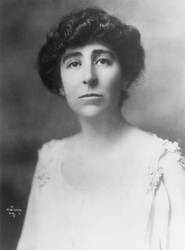History of Feminism
Related: About this forumJeannette Rankin
Last edited Sat Dec 8, 2012, 02:16 AM - Edit history (1)
The first woman elected to the US Congress, Jeannette Rankin impresses me as mostly a courageous person. You'd have to have a lot of courage to sit in Congress on the 8th of December 1941 and be the only one to vote against declaring war on Japan. But Jeannette Rankin was a pacifist and defended her vote by saying, "As a woman, I can't go to war and I refuse to send anyone else." Tomorrow is the 71at Anniversary of that vote. I wish more of Congress would vote as she did, by their convictions, rather than using their votes as bargaining chips as sometimes happens today.
She was first elected to Congress in 1916, which amazes me because the 19th Amendment hadn't yet been passed. Women got the vote in Montana in 1914. She worked as a visiting nurse in New York City tenements and then for civil and women's rights. In her first term in Congress she voted against entering WWI saying, "I felt the first time the first woman had a chance to say no to war she should say it."
http://en.wikipedia.org/wiki/Jeannette_Rankin

hlthe2b
(102,291 posts)Can you imagine how the men in Congress must have reacted--first to her being there at all and then to the fact she opposed war?
I have a feeling she lived a fascnating life. Thanks for this intro to this important, yet largely unrecognized lady.
discntnt_irny_srcsm
(18,479 posts)ismnotwasm
(41,989 posts)A Lone Woman's Voice
Jeannette Rankin:A Political Woman
By James J. Lopach and Jean A. Luckowski
This review I found sounds a bit biased, but I still think it would be worth a read. It's probably out of print.
of all political stripes poured their hopes and aspirations. Sometimes the movement was aligned with conservative causes such as temperance and other efforts to counterbalance the violent, corrupt, or philandering male. As one Rankin supporter in Wisconsin put it in a campaign song:
She will win for us the fight
She will win for us the battle Johnny Booze be put to flight
Long will ring her praise a
Other times, suffrage was embraced by radicals who thought women's votes would "break the alleged control of the privileged class." Still other times, it was a convenient mask for racism, as when suffragists assured Southerners that the votes of white women would be a useful counterbalance to those of blacks.
Rankin herself saw suffrage as inextricably linked to peace; she believed women were the true agents of social change and the only hope for ending war. During World War II a frustrated Rankin told a friend, "I am going to live as peacefully as I can, and let the world kill off the men." iinteresting to note the political crosscurrents that ran though Rankin's life and times. Suffrage was a kind of empty vessel into which advocates
of all political stripes poured their hopes and aspirations. Sometimes the movement was aligned with conservative causes such as temperance and other efforts to counterbalance the violent, corrupt, or philandering male. As one Rankin supporter in Wisconsin put it in a campaign song:
She will win for us the fight
She will win for us the battle Johnny Booze be put to flight
Long will ring her praise and glory
Other times, suffrage was embraced by radicals who thought women's votes would "break the alleged control of the privileged class." Still other times, it was a convenient mask for racism, as when suffragists assured Southerners that the votes of white women would be a useful counterbalance to those of blacks.
Rankin herself saw suffrage as inextricably linked to peace; she believed women were the true agents of social change and the only hope for ending war. During World War II a frustrated Rankin told a friend, "1am going to live as peacefully as I can, and let the world kill off the men."
Rankin's unwavering pacifism also led her to strange alliances. The champion of equality seemed not to see the irony in her enthusiastic backing of Charles Lindbergh, whose opposition to World War II was informed by nativism and anti-Semitism. Ultimately, for Rankin, fighting war trumped fighting discrimination.
Eighty-six years after women achieved suffrage, just fifteen percent of the US Congress is female. Electing more women to public office is not merely a matter of simple equity. As Jeanette Rankin proved, it can mean the difference between war and peace-between life and death.
Renee Loth is the editorial page editor of the Boston Globe.
discntnt_irny_srcsm
(18,479 posts)I found some high points here: http://www.herstorynetwork.com/women-making-herstory/breaking-glass-ceiling/jeannette-rankin/
...and I've been reading a bit on this site.
Thanks for the bio data. ![]()
ismnotwasm
(41,989 posts)discntnt_irny_srcsm
(18,479 posts)My family is all female. My dog is a girl as are most of the cats.
I started researching female role models when my daughters were young since they were a bit scarce in movies and such. Now it's kind of a hobby. I have a few in mind to write about between now and the New Year. I'm glad I found a place here to share them.